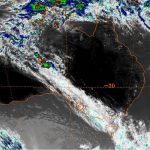 August 15, 2019 12:50 pm
Published by Climate Extremes
August 15, 2019 12:50 pm
Published by Climate Extremes
This study answers the questions: how different is the meteorology of heatwaves in NSW from those in Victoria, and how representative were the heatwaves of 2017 of previous heatwaves in NSW?
 August 15, 2019 11:58 am
Published by Climate Extremes
August 15, 2019 11:58 am
Published by Climate Extremes
This study uses 13 years of weather radar data in Darwin, Australia, to investigate how the structure of convective clouds relates to the environment they are embedded in.
 August 15, 2019 11:14 am
Published by Climate Extremes
August 15, 2019 11:14 am
Published by Climate Extremes
CLEX researchers examined the behaviour of a passive tracer released near the seafloor in an idealised two-dimensional flow driven by bottom-enhanced turbulence.
 August 14, 2019 11:39 am
Published by Climate Extremes
August 14, 2019 11:39 am
Published by Climate Extremes
The ARC Centre of Excellence for Climate Extremes has contributed to a new scientific study that reveals that extremely hot and cold temperatures, drought and heavy rainfall strongly affect the year-to-year variation in the total global yield of four important crops.
 August 2, 2019 11:34 am
Published by Climate Extremes
August 2, 2019 11:34 am
Published by Climate Extremes
This release is to advise the community that an ACCESS Oversight Committee has been formed initially comprising Christian Jakob, Rachel Law, Helen Cleugh, Andy Pitman, Tony Hirst, Peter May, David Karoly and Ben Evans. Terms of reference have been agreed to by the group and can be found at the end of this document.
 August 2, 2019 8:57 am
Published by Climate Extremes
August 2, 2019 8:57 am
Published by Climate Extremes
The Coupled Model Intercomparison Project (CMIP6) Model Analysis Workshop was held in Barcelona from March 25-28, 2019, and provided the first opportunity for results from CMIP6 models to be discussed and presented by the modelling community.
 August 2, 2019 2:27 am
Published by Climate Extremes
August 2, 2019 2:27 am
Published by Climate Extremes
Kim had her first paper accepted in the Journal of Climate and was over the moon but sneaking up behind her was another first she didn't expect - her first bout of imposter syndrome.
 July 18, 2019 8:28 am
Published by Climate Extremes
July 18, 2019 8:28 am
Published by Climate Extremes
Gabriela Pilo and colleagues find that the Tasman Front is not so much a constant current, as is widely accepted, but switches between being an extension of the East Australian Current and an eddy field.
 July 11, 2019 11:22 am
Published by Climate Extremes
July 11, 2019 11:22 am
Published by Climate Extremes
CLEX researchers working with colleagues from the Hawkesbury Institute for the Environment revealed a method to predict the probability of tree mortality during droughts.
 July 9, 2019 9:00 am
Published by Climate Extremes
July 9, 2019 9:00 am
Published by Climate Extremes
Climate scientists testing a new mathematical and statistical method that converts projections of future climate outcomes in a warming world into reliable probabilities have found there is a significant chance the Arctic could be ice-free even if world leaders meet the Paris targets of 1.5°C and 2°C.










